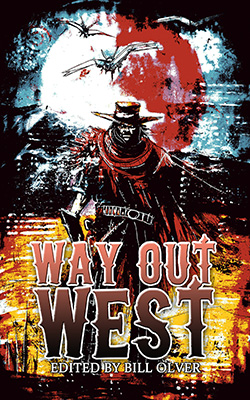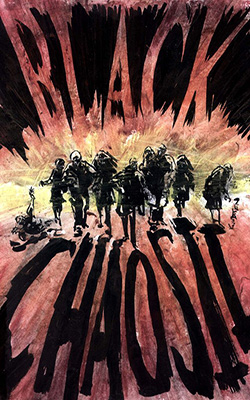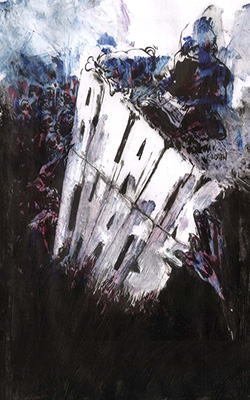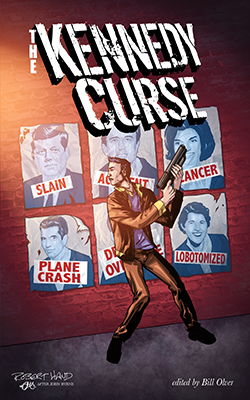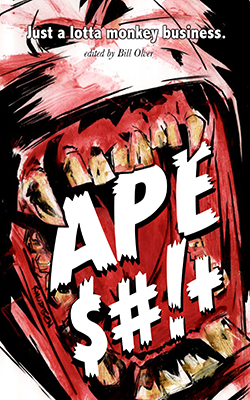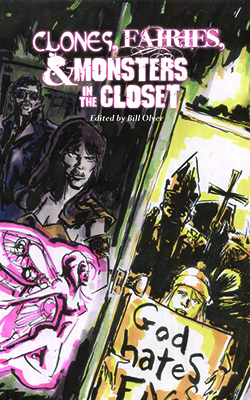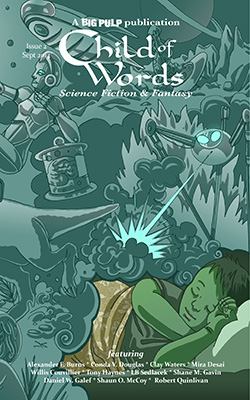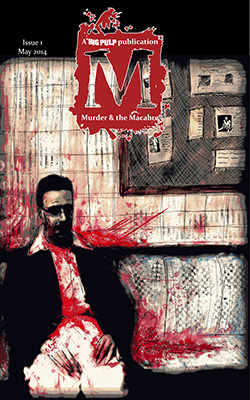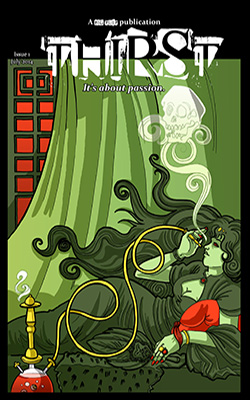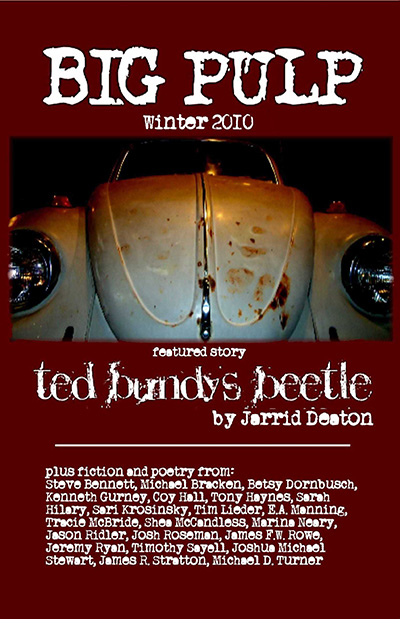
I was stuck in the small west Texas town where I’d been raised, waiting for a radiator to replace the one I’d blown in the heat and sleeping off the tail-end of a two-day drunk. When the door of my motel room opened and in walked a pudgy blonde wearing a blood red tube top, white hot pants, and a well-worn pair of blue flip-flops, I stared at her with one half-opened eye that wouldn’t focus properly.
“I thought I locked that door,” I mumbled.
“You did.” She held up a master key.
I opened my other eye. Outside was nothing but flat as far as the eye could see. Inside were more curves than a sidewinder trail in the dust.
“I knew your grandfather,” the blonde said.
“It’s a small town,” I replied. “Everybody knew my grandfather.”
I’d started drinking after his funeral on Friday and hadn’t stopped until—well, I hadn’t stopped, I’d just passed out between drinks. The inside of my mouth felt as dry as the motel parking lot, so I looked around my room. Both bottles of Southern Comfort were empty, but a good half-inch of Coke remained at the bottom of a plastic 2-liter bottle.
I sat up and reached for the Coke. The sweaty sheet bunched at my waist, exposing my chest. Then I leaned against the headboard and drank. The soda was warm and flat and felt thick as mud when I swallowed.
“You should get dressed.” At least a half dozen years younger than me, the blonde seemed familiar. I didn’t know why. “I have something to show you.”
I thought about that for a moment, and then flipped back the sheet. She examined me without comment.
I stood and padded into the bathroom, voided my bladder, and then showered. When I finished, the blonde was still standing near the door. She hadn’t been there the entire time, though. She’d rifled my pants pockets and looked through my wallet. I wondered what she’d been looking for and if she’d found it.
My last pair of clean underwear, the thin cotton ones covered with yellow smiley faces that an ex-girlfriend had given me one Christmas, had migrated to the bottom of my duffel bag. I pulled them on, then followed with tube socks, faded boot-cut Wranglers, well-worn black Ropers, and a loose-fitting Longhorns T-shirt.
The blonde’s eyes widened in surprise when I reached under my pillow and retrieved a .38 in a brown leather holster. I tucked it into my waistband at the small of my back and flipped the tail of my T-shirt over it.
I glanced at myself in the mirror. I needed to do something with my hair, but it could wait. I turned to the blonde. “What do you have to show me?”
She led me outside to a Chevy step-side, a two-tone job equal parts dirt and rust. If it had ever been another color, it wasn’t obvious. She climbed behind the wheel, and I climbed in beside her. Only her purse separated us.
We drove to my grandfather’s house, a dilapidated two-bedroom ranch with a water cooler on the roof, a place just outside of town that I had sworn never to enter again. She parked in the driveway, a slash of hard-packed clay that divided the sun-scorched crab grass into two unequal sections.
“Why here?” I asked. I’d inherited the house, the surrounding property, and a burnt orange Plymouth Volaré that had seen better days. I hadn’t inherited my grandfather’s desire for isolation.
“This is where it happened.” The blonde slipped out of the truck and walked around to my side. She pulled my door open. “Well?”
When my boots hit the driveway, a cloud of dust billowed up around my ankles. I looked the place over. Nothing had changed in the years since I had moved away. The tallest thing in the yard was still the mailbox nailed to a post out by the road.
She led me to the house and opened the front door. A wall of heat and a god-awful smell blasted me full in the face.
“It’s been locked up since they found him,” she said.
“I guess he died alone,” I said. “Death certificate says he died a natural death.”
“He died natural enough. He bled to death after taking a .22 long in the base of his skull.”
I stepped into my grandfather’s living room for the first time in nearly eighteen years. The shotgun remained over the mantle, family photos covered one wall, and memories filled the remaining space. “The coroner didn’t notice the hole?”
“Coroner’s not a doctor, she’s a mortician. County can’t afford an M.E.” She led me inside. Sunlight burned through the front window, cooking the room like the heat lamp at a fast food joint.
I choked on the smell, and my eyes began to water.
“He was in here a week before anyone noticed,” she said. “When his mailbox filled up, the postman looked in the window and saw your grandfather laying over there.”
She pointed toward the far side of the room, near the fireplace.
“He’d been sitting in that chair, reading the newspaper. After he was shot, he fell forward and landed on it,” she said. “That’s how they figured time of death.”
I’d seen a copy of my grandfather’s death certificate at the funeral home, and another copy at the lawyer’s office when I attended the reading of the will. “Death certificate only mentioned date of death.”
“Close enough,” she said. Sweat beaded on her forehead and she wiped it away with the back of her hand. “The paper’s delivered here around seven every morning. The next day’s paper was still in the front yard when they hauled his body away.”
I stepped toward the stained carpet, disturbing the flies feeding on the dried blood. I backed away quickly.
“I saw your license,” she said. “Are you really a private investigator?”
“Insurance fraud, mostly,” I explained. I had my back to her, examining dusty, wall-hung family photos that stretched back to my mother’s childhood years. “Workman’s comp claims. Guys who say they’ve injured their backs until I catch them carrying out the trash or playing football with their kids.”
“You like your work?”
“It pays the bills.” I lifted a photo of my mother off the wall and blew the dust from it. She had died before I had a chance to know her, and her death had left me alone with my grandfather.
“You good at what you do?”
“Good enough.” I turned to face the blonde. “Why?”
She shrugged and her breasts bounced in the tube top. A different time and a different place and I might have ventured a second look.
I carried the photo of my mother outside, and I sat with it on the concrete steps. The blonde joined me.
“You see that house down there?” she asked, pointing west. She indicated an abandoned two-bedroom ranch with a stove-in roof. “I lived down there. Moved in about a year before you left.”
I remembered her, then. Little Miss Independence, always had her own ideas about things and wouldn’t let the bigger kids tell her what to do. She’d been too young to play with, but I’d let her follow me around that last summer I’d lived with my grandfather.
“It wasn’t just you.”
I turned to face her. “What are you saying?”
“That’s why you left, isn’t it?” She slipped off one of her flip-flops and slapped at a couple of flies that had followed us outside. “To get away from him.”
The morning sun had climbed to its zenith and would soon slide down the sky toward evening, casting the east-facing front porch in shadow. I had nothing to say to this woman who, as an irritating little girl, had followed me around for a summer when I was fourteen.
“People knew what he was doing,” she said. “How could they not know?”
“The world was different back then,” I told her. “Who would have believed us?”
I looked down at the photograph of my mother. I had her eyes, her nose, and her wire-thin build. I couldn’t remember the sound of her voice or the feel of her touch or the smell of her skin. She’d committed suicide three days after my first birthday, walking out into the mesquite and prickly pear behind the house and swallowing both barrels of my grandfather’s shotgun. After her funeral, he’d cleaned the gun and returned it to its mount above the fireplace, where I saw it every day until I ran away.
“I married a guy right out of high school,” the blonde said, “and moved to Dallas. Travis Wayne left us last year when he realized the baby wasn’t his.”
I wet my lips with the tip of my tongue. At a nightclub in Austin, it might have been a sexy come-on. In the dry, mid-day heat of west Texas it was the only way to keep my lips from chapping.
“I didn’t want to come back here,” she said. “I knew I would run into him sooner or later, but we didn’t have anyplace else to go.”
“Run into who?”
“Your grandfather. I saw him talking to my daughter in the grocery store that morning,” she said. “Amy’s only five.”
I’d been six when it started.
After sitting for a while, we returned to the truck. As we climbed in, I bumped the blonde’s purse with my mother’s framed photo and it spilled over onto the seat. She quickly scooped up her checkbook, tampons, and an AMT Backup and returned them to her purse. I watched the pistol disappear and then I looked up at her.
She looked back.
Neither of us spoke.
On the ride to town, I finally asked, “Where do you live?”
“With my mother,” she said. “She’s the mortician.”
The blonde dropped me off in front of my motel room and I stepped inside. An aging air-conditioner struggled to push the room temperature down to a barely-tolerable level. I glanced around. The maid had visited in my absence and had cleaned up my mess, replacing my sweaty sheets and dirty towels, discarding my empty bottles, and stacking my papers neatly. She’d even hung up the black sheath dress I’d worn to my grandfather’s funeral.
I phoned the garage and learned that my car wouldn’t be ready until morning, so I walked to the liquor store and purchased another bottle of Southern Comfort. Back in my room, I stared at my mother’s photo while silently toasting my half-sister’s mother, small towns, and family ties.
Southern Comfort
originally published in Big Pulp Winter 2010: Ted Bundy's Beetle
Michael Bracken is the author of 11 books—including the private eye novel All White Girls— but is better known as the author of more than 800 short stories published in Ellery Queen’s Mystery Magazine, Espionage, Flesh & Blood: Guilty as Sin, Hardboiled, Hot Blood: Strange Bedfellows, Mike Shayne Mystery Magazine, Out of the Gutter, and many other publications. Bracken has also edited five crime fiction anthologies, including the three-volume Fedora series. Learn more at http://www.CrimeFictionWriter.com.


